Beijing—My Dream City

Yves Mouillet (second right) livestreams on a high-speed train on February 18, 2022, during the Beijing 2022 Olympic Winter Games (COURTESY PHOTO)
In 2009, I made the decision to take the plunge and settle in Beijing, the city of my dreams. After the Olympic Summer Games Beijing 2008, the city became filled with a mingling of ultra-modern and historical structures. Most of them are already known worldwide for their architectural beauty and technical prowess. I am thinking of the National Center for the Performing Arts, the China Central Television Tower and, more recently, the China Zun skyscraper, which reaches 528 meters in height, to name but a few.
Like most of the major Chinese megalopolises, Beijing has had a makeover and acquired these new symbols, just as Paris did with the Eiffel Tower 100 years ago. Some of my Beijing friends, who have previously lived in Europe for around 10 years, keep telling me that they no longer recognize the city of their childhood and get lost very easily. They pointed out that urban changes were rare in France. Even after decades without visiting these cities, they found their way around quite easily since hardly anything had changed.
During my years of living in Beijing, I have had the opportunity to witness its incredible evolution. The clothing of passers-by in Beijing's streets is one of the most striking examples. According to my standards as a young French person in the early 2000s, most people I encountered in the city on my first visit in 2007 didn't attach much importance to their appearance. Now, Sanlitun, Beijing's "trendy" district, has undergone profound remodeling and has become a mecca for luxury and fashion. The brands of department stores have increased significantly. The 20-40 age group now has a very original style. People are looking to assert themselves through their outfits.
Education has also improved dramatically. I have witnessed clear growth on all fronts, particularly in the language ability of Beijing's residents. Beginning with the generation born in the 1980s, the evolution of the standard of living has allowed many to study in other countries, enabling them to acquire new intercultural skills and, of course, an open mind and new expertise. You can ask for directions in the streets of Beijing and most students will be able to respond in English or even in other languages.
Another point to note is that Beijing used to be frequently engulfed by air pollution, but there has been a significant improvement. The blue sky is now a common part of our daily lives.
Other changes that have left an indelible impression on me include Beijing's roads, which have undergone a profound transformation as a result of the proliferation of electric vehicles. I travel by electric vehicle myself, which always impresses my European friends, but it has already become normal here in China. Beijing has nearly as many electric vehicle charging stations as the entire United States, indicating the efforts that have been made.
People's way of life has also profoundly changed in all areas due to the impact of technological progress. While waving to hail a taxi is still the norm on the streets of New York City, Chinese people now almost exclusively use ride-hailing apps. We also see a constant ballet of parcel and food delivery riders on the streets, responding to ever-increasing digital demands. Payments, orders, reservations—everything can be achieved through mobile phones.
China is one of the major players in the 21st century—a giant that never stops campaigning for a multipolar world and which, despite its power, demonstrates rare benevolence. I sincerely hope that Westerners will seek to know China better and that people worldwide can perceive a different China in a different world. After all, you can't see the difference with your eyes closed. Real knowledge is the best tool to change stereotypes.